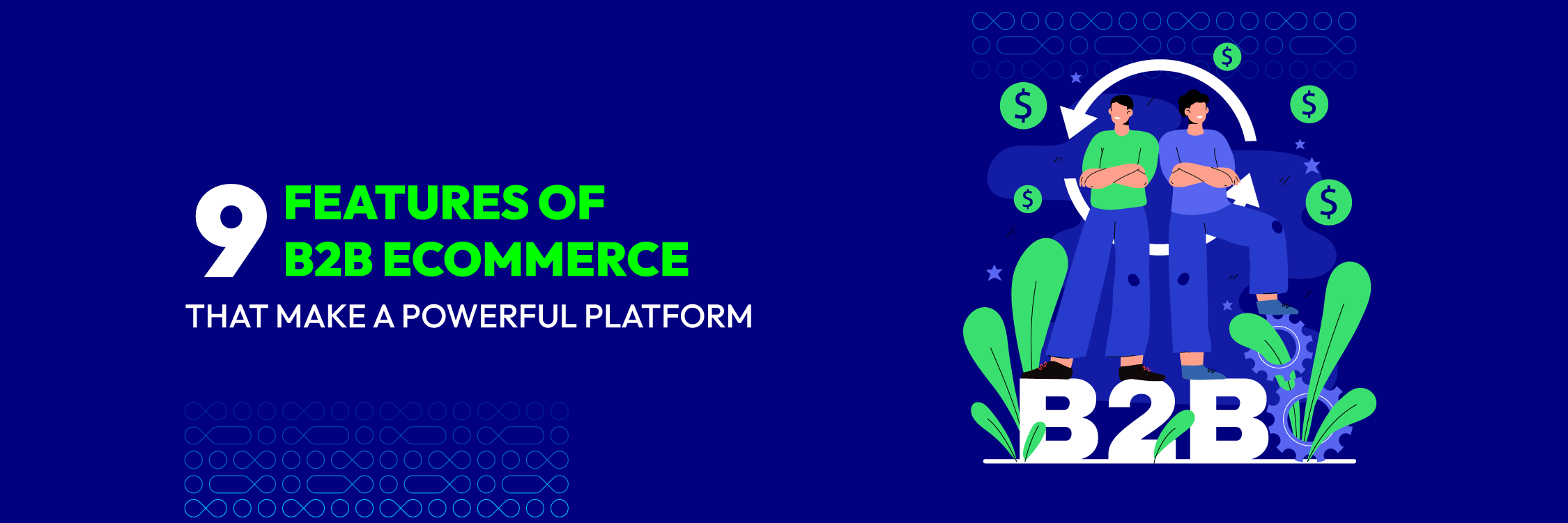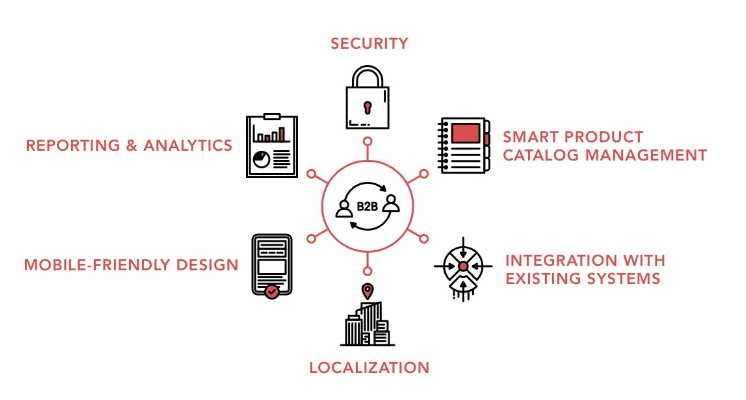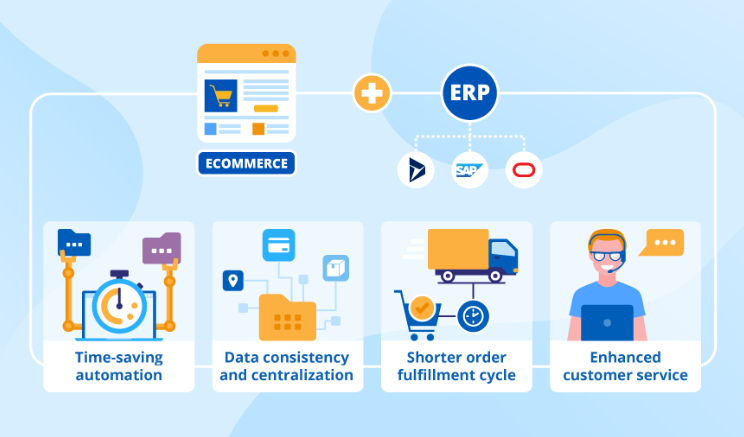9 Features of B2B eCommerce That Make A Powerful Platform

B2B eCommerce has rapidly transformed the landscape of commerce, revolutionizing the way businesses interact, trade, and grow. In the digital age, features of B2B eCommerce platforms enable seamless transactions, fostering stronger relationships between businesses, and enhancing operational efficiency. A powerful B2B eCommerce platform goes beyond a mere online store because it encompasses a multitude of features designed to cater specifically to the needs and complexities of B2B transactions. In this article, we will learn about 9 key features of B2B eCommerce that make a platform powerful and indispensable for modern businesses.
What features of B2B eCommerce for a powerful platform?

1. Customized pricing and quoting
B2B transactions often involve complex pricing structures based on factors like volume, contract terms, and customer segments. The features of B2B eCommerce powerful platform allows businesses to offer personalized pricing, discounts, and quotes tailored to individual customers or groups. Here is a look at how the feature works:
Dynamic pricing
B2B transactions often involve negotiations and different pricing structures for various customers. The platform allows sellers to set up dynamic pricing rules based on factors like order quantity, customer type, contract terms, and more.
Contract pricing
Some B2B relationships are governed by contracts that outline specific pricing terms. The platform can enforce these contract prices, ensuring consistency and accuracy in transactions.
Customer segmentation
Sellers can segment their customers based on attributes like loyalty, order history, industry, or geography. This segmentation allows for targeted pricing strategies to reward loyal customers or attract new ones.
Negotiation support
For more complex deals, the platform may offer negotiation tools that allow buyers and sellers to communicate and agree upon pricing terms before finalizing the order.
Discount management
B2B eCommerce platforms provide tools to manage volume-based discounts, promotional discounts, and bulk purchase discounts. These discounts can be automatically applied during the ordering process.
Quoting
Instead of instant checkout, B2B buyers often request quotes for large or customized orders. The platform should support the generation and sharing of detailed quotes that outline the products, quantities, pricing, and terms.
Approval workflows
In some cases, orders or quotes need to go through an approval process within the buying organization. The platform can facilitate these workflows, ensuring that orders adhere to internal protocols.
2. Multiple catalogs and product variants
The features B2B eCommerce involves selling a wide range of products with various specifications. A robust platform should support the creation of multiple catalogs, product variants, and configurations to cater to different customer needs. Here is details of this feature:
Multiple Catalogs
B2B businesses often cater to diverse customer segments, each with specific needs and interests. Multiple catalogs enable businesses to create distinct product collections tailored to these segments. Here is how this feature works:
- Segmentation: Sellers can organize products into separate catalogs based on criteria such as industry, customer type, product category, or geographic location.
- Targeted content: Each catalog can showcase products and content relevant to a specific audience, enhancing the user experience.
- Personalization: Customers accessing different catalogs can see products that resonate with their requirements, resulting in a more personalized shopping journey.
- Specialization: If a business operates in various industries, it can maintain catalogs that specialize in each industry’s unique product offerings.
Product Variants
B2B products often come in different variations, such as sizes, colors, specifications, or configurations. Product variants streamline the buying process by allowing customers to choose the exact options they need. How does this feature work?
- Flexible options: Each product can have multiple variations with unique attributes, allowing customers to select the precise specifications they require.
- Clear display: Product variant information is presented clearly, helping buyers make informed decisions about the specific attributes they want.
- Inventory management: The platform tracks inventory levels for each product variant, preventing overselling and backorders.
- Consistency: Buyers receive the exact product they expect, as they can choose the appropriate attributes during the purchase.
3.Account and user management
B2B transactions involve different roles within a business, from procurement managers to accountants. The platform should allow for multi-user account management, with varying levels of access and permissions based on roles, ensuring a seamless buying process. Here is a look at this feature:
Role-based access
B2B businesses often have different departments and roles involved in the purchasing process. This feature allows for the creation of different user roles with varying levels of access and privileges. Common roles include:
- Buyer: Regular users who can browse products, place orders, and manage their account details.
- Purchasing manager: Users with authority to approve and finalize orders.
- Administrator: Users responsible for managing the platform, adding products, and overseeing user accounts.
- Sales representative: Users who assist customers, provide quotes, and facilitate orders.
User Permissions
With role-based access, businesses can assign specific permissions to each user role. This ensures that users can only access and perform tasks relevant to their responsibilities. For example:
- Purchasing managers: Can approve orders, view order history, and access financial information.
- Sales representatives: Can generate quotes, access customer information, and track leads.
- Buyers: Can browse products, add items to the cart, and manage their account settings.
Account Hierarchy
B2B organizations may have multiple branches or divisions. Account hierarchy features allow parent companies to manage sub-accounts, ensuring consistent purchasing processes and oversight:
- Centralized control: Parent companies can manage user access and permissions across subsidiary accounts.
- Uniform policies: Ensures that procurement processes, pricing, and terms are consistent across the organization.
Multi-User Management
Businesses can invite multiple users to access their B2B eCommerce account under a single organization. This facilitates teamwork, collaboration, and coordinated purchasing efforts:
- Shared responsibilities: Different team members can collaborate on building orders and making purchasing decisions.
- Efficient order processing: Users can submit orders on behalf of their team, streamlining the purchasing process.
Customized Dashboards
Different user roles require different information. Customized dashboards present relevant data to each user upon login:
- Sales representatives: See leads, quotes, and customer interactions.
- Purchasing managers: View pending approvals, order history, and budget tracking.
- Administrators: Access platform management tools and performance analytics.
4. Advanced search and filtering
B2B buyers often have specific product requirements. A powerful platform offers advanced search and filtering capabilities that allow users to quickly locate products based on attributes, categories, SKUs, and more. Here is a detailed overview:
Advanced Search
B2B buyers often have specific requirements when searching for products. Advanced search features provide them with the tools to find products based on various criteria:
- Keyword search: Users can enter keywords or phrases to search for relevant products.
- Filters: Advanced filters allow users to narrow down results by attributes like category, price range, specifications, and more.
- Attributes: Users can search by specific product attributes, such as size, color, material, and technical specifications.
- SKU/Part number: Directly searching by SKU or part number helps users find the exact product they’re looking for.
Filtering Options
Filtering options enable users to refine their search results based on specific parameters. Common filtering options include:
- Category: Organize products into categories to allow users to focus on specific product groups.
- Price range: Set a budget and view products that fall within that range.
- Availability: Display products that are currently in stock or available for purchase.
- Attributes: Filter by attributes like size, color, material, and more to match precise requirements.
- Brand/Manufacturer: Filter by brand to find products from specific manufacturers.
- Rating/Reviews: Sort products based on customer ratings and reviews.
Faceted Search
Faceted search is a dynamic way of narrowing down search results by providing users with relevant filters based on the current search context. As users apply filters, the available filter options adjust accordingly.
5. Integration with ERP and CRM systems
Integration with Enterprise Resource Planning (ERP) and Customer Relationship Management (CRM) systems is crucial for automating data synchronization, order processing, inventory management, and customer information updates. Let’s explore this feature in detail:
Integration with ERP Systems
ERP systems are essential for managing various aspects of business operations, including inventory management, order processing, accounting, and more. Integrating the B2B eCommerce platform with an ERP system offers numerous benefits:
- Real-time inventory: Integration ensures that product availability is accurate and up-to-date, preventing overselling and backorders.
- Order processing: Orders placed through the eCommerce platform are seamlessly transferred to the ERP system for processing and fulfillment.
- Automated workflows: Integration streamlines order fulfillment processes, reducing manual interventions and errors.
- Invoice and payment sync: Invoices and payment information are automatically synchronized between the eCommerce platform and ERP, maintaining financial accuracy.
- Consistent data: Data consistency across platforms prevents discrepancies and improves decision-making.

Integration with CRM Systems
CRM systems help businesses manage customer interactions and relationships. Integrating the B2B eCommerce platform with a CRM system brings several advantages:
- Customer insights: Integration provides a comprehensive view of customer interactions, allowing for personalized communication and offers.
- 360-Degree view: Sales representatives can access customer information, purchase history, and communication records directly from the CRM system.
- Lead management: eCommerce interactions can be tracked as leads within the CRM, facilitating follow-ups and nurturing potential customers.
- Order tracking: Customers can track their orders and shipments within the CRM interface, enhancing transparency.
- Marketing automation: CRM data can inform targeted marketing efforts, improving engagement and conversions.
Salesforce CRM
Integration Service
Integrate Salesforce CRM with your M2 store to automate your workflow and establish long-lasting customer relationships.
Explore More6. Bulk ordering and quick reordering
B2B buyers frequently order products in bulk quantities. The platform should support bulk ordering through CSV uploads or other streamlined methods, as well as provide features for quick reordering of previously purchased items. Let’s explore this feature in detail:
Bulk ordering
B2B transactions often involve purchasing products in larger quantities to fulfill business needs. The bulk ordering feature addresses this requirement:
- Volume discounts: Bulk ordering can trigger automatic volume-based discounts, incentivizing customers to order larger quantities.
- CSV upload: Instead of adding products one by one, buyers can upload a CSV file containing a list of products and quantities they wish to purchase.
- Saved carts: Customers can add items to their cart over time and then proceed to bulk order when ready, saving time and effort.
- Customization: Bulk ordering tools allow customization of quantities, variations, and other options for each product.
Quick Reordering
Businesses often need to reorder the same products regularly. The quick reordering feature simplifies this process:
- Order history: Users can view their past orders and quickly reorder items they’ve purchased before.
- One-Click reorder: With a single click, users can recreate an entire order from their history without needing to search for each product again.
- Product lists: Users can create lists of frequently ordered products, making it easy to reorder a selection of items with minimal effort.
7. Multichannel support
The features of B2B eCommerce allow businesses to engage with customers across various channels, such as web, mobile, social media, and marketplaces, providing a consistent buying experience. Here is overview of multichannel support feature:
Online channels
B2B businesses operate in a digital landscape where customers interact with brands across multiple online platforms:
- Website: The primary eCommerce website serves as the central hub for product information, transactions, and customer interactions.
- Mobile app: A dedicated mobile app offers a convenient way for customers to browse products, place orders, and access their accounts on the go.
- Marketplaces: Selling on popular B2B marketplaces or platforms can extend reach to a wider audience and tap into existing customer bases.
- Social media: Businesses can leverage social media platforms for product promotion, customer engagement, and brand awareness.
Offline Channels
B2B interactions may also take place offline, and multichannel support should seamlessly integrate these interactions:
- In-person: Sales representatives can use digital tools to showcase products, generate quotes, and capture orders during face-to-face meetings.
- Trade shows/events: B2B businesses often participate in trade shows or industry events where they can showcase products and interact with potential customers.
- Phone orders: Some customers prefer placing orders over the phone. Multichannel support ensures that these orders are accurately processed.
Unified experience
The goal of multichannel support is to provide a unified and consistent experience across all channels:
- Single customer view: Regardless of the channel, customers should have access to their order history, account details, and preferences.
- Consistent pricing: Pricing, discounts, and promotions should be uniform across all channels to avoid confusion and maintain transparency.
- Branding: Branding elements and messaging should remain consistent across all touchpoints to reinforce the brand identity.
8. Robust checkout and payment options
One of features of B2B eCommerce are robust checkout and payment options. Complex B2B transactions may involve different payment terms, such as net terms or purchase orders. The platform should accommodate these payment options while providing a secure and user-friendly checkout process. Here is look at this feature:
Streamlined checkout
B2B buyers appreciate a smooth and efficient checkout process that minimizes friction and maximizes convenience:
- Guest checkout: Allow users to complete purchases without creating an account, reducing barriers to entry.
- Saved addresses: Store frequently used shipping addresses for quick selection during checkout.
- Auto-Fill: Simplify data entry by automatically filling in information like addresses and contact details.
- Progress indicators: Clearly display the steps of the checkout process, helping users understand their progress.
Multiple Payment Options
Businesses often have diverse payment preferences. A variety of payment options accommodates these preferences:
- Credit/Debit cards: Support major credit and debit cards for quick and secure payments.
- Purchase orders: Allow businesses to pay using purchase orders, which is a common payment method in B2B transactions.
- Bank transfers: Offer bank transfer options for businesses preferring direct transfers from their bank accounts.
- E-wallets: Include options for digital wallets like PayPal, Apple Pay, and Google Pay for added convenience.
- Financing: Provide financing options or credit terms for larger purchases, facilitating cash flow for buyers.
For example, if you use the Magento platform for your store, with just one plugin like M2 One Step Checkout, your store will be compatible with most payment methods in the market.
Secure Transactions
Security is paramount in B2B transactions. Implement robust security measures to instill trust and protect sensitive information:
-
SSL encryption: Secure the checkout process with SSL encryption to protect customer data during transmission.
-
PCI compliance: Ensure that the payment processing meets Payment Card Industry Data Security Standard (PCI DSS) requirements.
-
Two-factor authentication: Enhance security by offering two-factor authentication for user accounts.
-
Fraud prevention: Implement fraud detection mechanisms to identify and prevent potentially fraudulent transactions.
Address Validation
Accurate shipping and billing addresses are crucial to successful B2B transactions:
- Address autocomplete: Assist users in entering accurate addresses by suggesting valid options as they type.
- Address validation: Validate addresses to minimize delivery errors and returns.
Analytics and reporting
Data-driven decision-making is essential in features of B2B eCommerce. The platform should offer advanced analytics and reporting features that provide insights into sales trends, customer behavior, inventory levels, and other key performance indicators. Here is look at this feature:
Sales analytics
B2B businesses can benefit from in-depth sales data to understand their performance:
- Revenue tracking: Monitor total sales revenue, both overall and segmented by time periods.
- Product performance: Analyze which products are top sellers, allowing businesses to focus on promoting these items.
- Category insights: Understand which product categories drive the most sales, guiding marketing efforts and inventory management.
- Customer behavior: Analyze customer purchasing patterns, average order values, and order frequency.
Customer Insights
Understanding customer behavior is crucial for building strong relationships and offering personalized experiences: Customer segmentation: Divide customers into segments based on factors such as industry, location, or purchase history for targeted marketing.
- Purchase history: Access detailed information about individual customer orders, providing insights for upselling and cross-selling opportunities.
- Lifetime value: Calculate the lifetime value of customers to understand their long-term contribution to the business.
Inventory Management
Accurate inventory management is essential to prevent stockouts and overstock situations:
- Stock levels: Monitor inventory levels in real-time, ensuring products are available when customers need them.
- Reorder points: Set automatic reorder points to restock products before they run out.
- Slow-moving items: Identify products that are not selling well to make informed decisions about promotions or discontinuation.
Conversion Rate Analysis
Analyzing conversion rates helps businesses understand the effectiveness of their sales funnel:
- Funnel analysis: Track user behavior through each step of the buying process, identifying areas where drop-offs occur.
- Abandoned carts: Understand why customers abandon their carts and implement strategies to recover lost sales.
Marketing Performance
Evaluate the success of marketing campaigns and strategies:
- Campaign tracking: Measure the impact of specific marketing campaigns on website traffic, leads, and sales.
- Traffic sources: Identify the sources (organic, paid, social media, etc.) that drive the most valuable traffic and conversions.
Conclusion
In the rapidly evolving landscape of B2B commerce, the success of businesses hinges on their ability to offer a comprehensive and efficient online experience to their customers. 9 key features outlined - from customized pricing and quoting to analytics and reporting - collectively shape a powerful features of B2B eCommerce platform that caters to the unique needs of business buyers. By providing tailored experiences, accommodating complex transactions, ensuring data accuracy, and fostering strong customer relationships, these features create a robust foundation for success.
In unison, 9 features of B2B eCommerce create a formidable platform that empowers businesses to navigate the challenges of modern commerce, adapt to evolving customer expectations, and capitalize on opportunities for growth. Whether streamlining transactions, enhancing customer relationships, or making data-driven decisions, these features collectively forge a path towards excellence in the world of B2B eCommerce.






